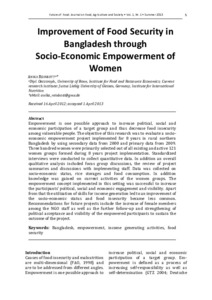Datum
2013-04-01Autor
Reinbott, AnikaSchlagwort
630 Landwirtschaft, VeterinärmedizinMetadata
Zur Langanzeige
Aufsatz

Improvement of Food Security in Bangladesh through Socio-Economic Empowerment of Women
Zusammenfassung
Empowerment is one possible approach to increase political, social and economic participation of a target group and thus decrease food insecurity among vulnerable people. The objective of this research was to evaluate a socio-economic empowerment project implemented for 8 years in rural northern Bangladesh by using secondary data from 2000 and primary data from 2009. Three hundred women were primarily selected out of all existing and active 121 women groups formed during 8 years project implementation. Standardized interviews were conducted to collect quantitative data. In addition an overall qualitative analysis included focus group discussions, the review of project summaries and discussions with implementing staff. Data was collected on socio-economic status, rice storages and food consumption. In addition knowledge was gained on current activities of the women groups. The empowerment concept implemented in this setting was successful to increase the participants’ political, social and economic engagement and visibility. Apart from that the utilization of skills for income generation led to an improvement of the socio-economic status and food insecurity became less common. Recommendations for future projects include the increase of female members among the NGO staff as well as the further follow-up and strengthening of political acceptance and visibility of the empowered participants to sustain the outcome of the project.
Zitierform
In: Future of Food: Journal on Food, Agriculture and Society. Witzenhausen : University of Kassel, Department of Organic Food Quality and Food Culture. - Vol. 1, No. 1 (2013), S. 5-12Zitieren
@article{urn:nbn:de:hebis:34-2014021044966,
author={Reinbott, Anika},
title={Improvement of Food Security in Bangladesh through Socio-Economic Empowerment of Women},
year={2013}
}
0500 Oax 0501 Text $btxt$2rdacontent 0502 Computermedien $bc$2rdacarrier 1100 2013$n2013 1500 1/eng 2050 ##0##urn:nbn:de:hebis:34-2014021044966 3000 Reinbott, Anika 4000 Improvement of Food Security in Bangladesh through Socio-Economic Empowerment of Women / Reinbott, Anika 4030 4060 Online-Ressource 4085 ##0##=u http://nbn-resolving.de/urn:nbn:de:hebis:34-2014021044966=x R 4204 \$dAufsatz 4170 7136 ##0##urn:nbn:de:hebis:34-2014021044966
<resource xsi:schemaLocation="http://datacite.org/schema/kernel-2.2 http://schema.datacite.org/meta/kernel-2.2/metadata.xsd"> 2014-02-10T09:04:49Z 2014-02-10T09:04:49Z 2013-04-01 2197-411X urn:nbn:de:hebis:34-2014021044966 http://hdl.handle.net/123456789/2014021044966 eng Department of Organic Food Quality and Food Culture at the University of Kassel, Germany and Federation of German Scientists (VDW) Urheberrechtlich geschützt https://rightsstatements.org/page/InC/1.0/ Bangladesh empowerment income generating activities food security 630 Improvement of Food Security in Bangladesh through Socio-Economic Empowerment of Women Aufsatz Empowerment is one possible approach to increase political, social and economic participation of a target group and thus decrease food insecurity among vulnerable people. The objective of this research was to evaluate a socio-economic empowerment project implemented for 8 years in rural northern Bangladesh by using secondary data from 2000 and primary data from 2009. Three hundred women were primarily selected out of all existing and active 121 women groups formed during 8 years project implementation. Standardized interviews were conducted to collect quantitative data. In addition an overall qualitative analysis included focus group discussions, the review of project summaries and discussions with implementing staff. Data was collected on socio-economic status, rice storages and food consumption. In addition knowledge was gained on current activities of the women groups. The empowerment concept implemented in this setting was successful to increase the participants’ political, social and economic engagement and visibility. Apart from that the utilization of skills for income generation led to an improvement of the socio-economic status and food insecurity became less common. Recommendations for future projects include the increase of female members among the NGO staff as well as the further follow-up and strengthening of political acceptance and visibility of the empowered participants to sustain the outcome of the project. open access In: Future of Food: Journal on Food, Agriculture and Society. Witzenhausen : University of Kassel, Department of Organic Food Quality and Food Culture. - Vol. 1, No. 1 (2013), S. 5-12 Reinbott, Anika </resource>
Die folgenden Lizenzbestimmungen sind mit dieser Ressource verbunden:
Urheberrechtlich geschützt

